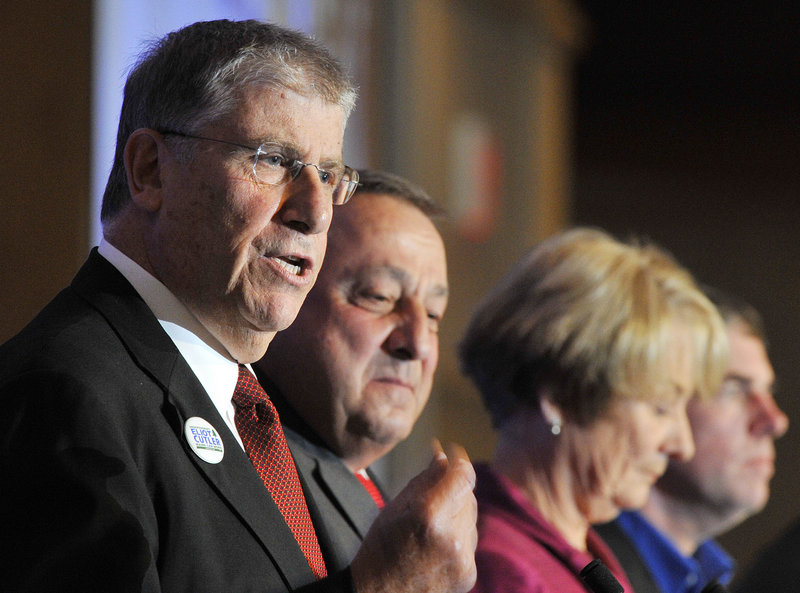PORTLAND — Education, taxes and health care — and their implications for business — were hot topics Wednesday at the Portland Regional Chamber’s “Eggs and Issues” breakfast.
Nearly 500 people packed the large ballroom at the Holiday Inn by the Bay to hear the five candidates on the Nov. 2 gubernatorial ballot. Moderated by WGME-TV’s Gregg Lagerquist, the debate featured questions written by the chamber and a few by the audience. Some of the questions went to all candidates, and others were targeted to just two of the five.
Republican Paul LePage and independent Eliot Cutler were asked whether they would support an increase in the gas tax to pay for road work.
Cutler said tourists who drive on some Maine roads would never come back because the roads are in such poor condition. He said the state doesn’t charge tolls on much of its highway system, and it doesn’t make drivers pay per mile, as they do in other states.
That leaves the gas tax, the state’s general fund and federal money as funding options, he said.
“I do not want to raise broad-based taxes until we have solved our budget problems,” he said. “We’ve got to fix our roads and bridges.”
LePage said part of the problem is that the state doesn’t do a good job prioritizing which roads should be repaired first. LePage, the mayor of Waterville, said the city sold a mile of road to Colby College to raise money to fix the road.
“I am not in favor of raising taxes at this time,” he said.
Democrat Libby Mitchell and independent Shawn Moody were asked about the business climate and what they would do to make it easier for businesses to succeed.
Mitchell, the state Senate president, said that in the past, the state has not focused its economic development efforts. She said there’s promise in creating jobs around wind power, biotechnology and natural resource processing in forestry, farming and fishing, for example.
“Maine’s work force is one of its best commodities,” she said.
Moody said state tax laws must be changed to give businesses a more favorable climate. For example, he said, businesses must be able to carry losses forward from one year to the next for tax purposes.
He said employee stock option plans have worked in his company — Moody’s Collision Centers — and should be considered in other areas.
“An ESOP gives you a succession plan to empower your co-workers to carry that legacy forward,” he said.
Independent Kevin Scott emphasized his plan to require all schools to use locally grown food, which he believes would be a major boost to the state economy.
“Children eating locally grown foods, healthy foods in our school districts, that will work,” he said.
On energy, Cutler said Maine should join 27 other states that have public power authorities. He said high electricity costs, as well as the price of health care, are barriers to growth.
The candidates, who have appeared at dozens of similar forums over the past several months, challenged each other from time to time. In that vein, a simmering debate over dropout rates continued between Cutler and LePage.
Cutler said the dropout rate in Waterville is twice as high as the state average.
State statistics — confirmed by the Department of Education — show the state average dropout rate is 3.59 percent. In Waterville, it’s 7.82 percent — a rate consistent with similarly sized cities, according to the department.
In response, LePage cited graduation rates — which are calculated differently — and said it’s not possible that Waterville’s dropout rate is twice as high as the state average.
“He’s full of bull,” LePage said.
LePage and Mitchell were asked whether Dirigo Health has worked and how new federal health care reforms will play out in Maine.
LePage said Dirigo has “failed miserably.”
“The governor, when he realized that, should have pulled the plug on Dirigo,” LePage said. He also called for dropping or reducing some mandates on insurance companies to try to lower the cost.
LePage referred to comments that Mitchell made at a previous debate, that mammograms are not a luxury. “I agree with her, but some of the other (mandates) are,” he said.
Mitchell said Dirigo will no longer be necessary once federal reforms take hold. Yet she defended the program. “There are thousands of Maine families that have benefited from Dirigo Health,” she said.
The chamber asked Moody and Scott — who have ranked fourth and fifth, respectively, in recent polls — how they would turn things around to win on Election Day. Those same polls have Mitchell and LePage in a statistical dead heat, followed by Cutler.
“We’re not new to starting against the odds,” said Moody, who made reference to opening his auto body shop when he was 17.
Scott said early surveys didn’t even ask about his chances — or Moody’s — and recent polling is unreliable because of the sample size.
He said he has supporters all over the state, from Aroostook County to Portland, Bangor, Eastport and Sanford, and he plans to campaign through to Election Day.
He then joked about his driving record, which shows 35 violations — many of them for speeding — since 1989.
“I’ll continue to travel the state of Maine slowly, with cruise control,” he said, drawing laughs from other candidates and the audience.
MaineToday Media State House Writer Susan Cover can be contacted at 620-7015 or at:
scover@centralmaine.com
Send questions/comments to the editors.


